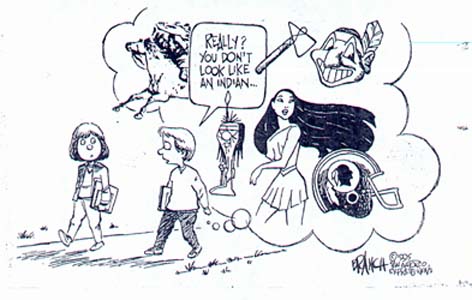The Jewish-born son of eastern European immigrants, Adler grew up in New York City, where the only exposure he had as a child to Native Americans came through school stories and western movies. Today, he practices Zen Buddhism and works as an English professor at a small community college in Los Angeles.
Not exactly the makings of a defender of Native rights.
"More than a century later all of the expected social afflictions and human maladies of a conquered and denigrated culture are present: inadequate education, joblessness, drug dependence, despair and poverty," he writes.
And yet, despite the wealth of evidence—historical and contemporary—to justify reform of Native programs and services, the U.S. government continues to fight any effort to seek such reform.
It's easy to be cynical, to question these people's motives. What do they have to gain? How are they profiting off Native misery?
And it seems naive to dare to see these rare acts of empathy for Native causes as sincere attempts to help.
That said, when I see a Jewish professor from Los Angeles invest the vast amounts of time and energy it undoubtedly took to write this fine article, I can't help but see it as a small step in a long march toward reconciliation.
Fortunately, I get more praise and less doubt than this writer gives Adler. But I may have more of a track record than Adler does.
Adler's "only exposure he had as a child to Native Americans came through school stories and western movies." In other words, he was a typical American. He never met a Native and he didn't learn about them from his parents, friends, or members of his community.


Writerfella here --
ReplyDeleteIt takes neither much intelligence nor motivation for any individual comparatively to recognize that certain ethnic and/or cultural comparisons may be drawn between EuroMan's treatment of his own people and those who are not his own people. But one must ask: about whom is the writer really writing? And for what reasons? Advocacy is easy, adversity is not. One requires faction, the other requires action. Therein lies the rub...
All Best
Russ Bates
'writerfella'
But advocacy can be more effective. On the Columbus Day issue, i think that Rob's protest in the form of the blogging he has done on the subject is more productive than such things as acts of violence at parades, etc which have happened.
ReplyDeleteWriterfella here --
ReplyDeleteAdvocacy CAN be more effective but one must present more than just an advocate's stance. The position MUST be visible, first off. Then it must be underscored by direct action. Lacking same, one's voice gets lost in the cloud...
By the bye, if you like 50's and 60's 'giant bug' movies, name the one that had the giant wasps. The clock is ticking...
All Best
Russ Bates
'writerfella'
I'm visible enough, thanks. For instance, search Google for "Indian stereotypes" and see what comes up first. That's right...Blue Corn Comics.
ReplyDeleteBut advocacy "must be underscored by direct action"? Says who? Millions of writers have made their mark simply by writing and publishing their thoughts.
I'd ask what actions you've taken, Russ, but you'd regale us with the same old anecdotes we've heard a dozen times. Suffice it to say you haven't done anything outside your writing that I'd consider momentous or memorable. Compared to activists such as Vine Deloria Jr., Russell Means, and Winona LaDuke, you're as much as wannabe as anyone.
Writerfella here --
ReplyDeleteAh, but writerfella makes no claim to be an activist or a role model or even much more than a working scribe who had quite a share of incredible luck. Early on, an 'activist,' Craig Carpenter, erstwhile Mohawk and self-styled militant, thought he could take over writerfella's efforts and directions, so that writerfella could do Carpenter's stories and articles and books and TV shows and movies. He found to his everlasting infuriation that writerfella only was interested in doing writerfella's stories and etc. BUT -- that confrontation led to writerfella becoming the first WGAw trainee to work for a major TV series at Universal Studios. On through time, because writerfella did only his own work, beneficent lightning continued to strike. When writerfella took on AIM or any of dozens of other Native dilemmas, it was as an individual, not as a professional, done as a person, not aa a personality. And writerfella says let all those others strive to make of themselves either "momentous or memorable." All writerfella ever has wanna be is writerfella, even though there is a public park in Norman, OK, named after him...
All Best
Russ Bates
'writerfella'
Not bragging too much, are you? Too bad hardly anyone knows about your TV series or your park.
ReplyDeleteWhy don't you tell us more about yourself, Russ? We've heard about your accomplishments only a dozen or so times, and I don't think that's enough.